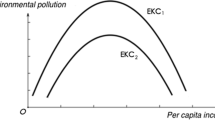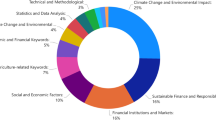Abstract
The prospects for new, decent jobs are large considering the transformation to a green economy. This article examines the environmental effects of human capital in the BRICS countries—Brazil, Russian Federation, India, China and South Africa—over the period 1990–2017. Environmental quality (deploying carbon emissions as the proxy) and environmental sustainability (utilising adjusted net savings, excluding particulate emission damage as the indicator) are identified as the dependent variables. This paper uses more recently developed econometric models, namely the Cross-sectionally Augmented Distributed Lag (CS-ARDL) method and the Dumitrescu-Hurlin causality technique to analyse the data. The findings demonstrate that human capital is significantly positively related to both environmental quality and environmental sustainability in both the short and long run. Human capital also forms a bi-directional causality relationship with environmental sustainability, and environmental quality also causes human capital (thereby showing a uni-directional causality). As such, the paper suggests that governments should develop a policy which promotes investments in greening human skills.
Similar content being viewed by others
References
Abdouli, M. & Omri, A. (2020). Exploring the Nexus among FDI inflows, environmental quality, human capital, and economic growth in the Mediterranean region. Journal of the Knowledge Economy, pp. 1-23.
Adedoyin, F.F., Alola, A.A. & Bekun, F.V. (2020). An assessment of environmental sustainability corridor: the role of economic expansion and research and development in EU countries. Science of The Total Environment, p. 136726.
Afolayan, O. T., Okodua, H., Oaikhenan, H., & Matthew, O. (2020). Carbon emissions, human capital investment and economic development in Nigeria. International Journal of Energy Economics and Policy, 10(2), 427–437.
Ahmad, M., Jiang, P., Majeed, A., Umar, M., Khan, Z., & Muhammad, S. (2020). The dynamic impact of natural resources, technological innovations and economic growth on ecological footprint: An advanced panel data estimation. Resources Policy, 69, 101817.
Ahmed, Z., Asghar, M. M., Malik, M. N., & Nawaz, K. (2020). Moving towards a sustainable environment: The dynamic linkage between natural resources, human capital, urbanization, economic growth, and ecological footprint in China. Resources Policy, 67, 101677.
Ahmed, Z., Zafar, M. W., & Ali, S. (2020). Linking urbanization, human capital, and the ecological footprint in G7 countries: An empirical analysis. Sustainable Cities and Society, 55, 102064.
Alege, P. O., Adediran, O., & Ogundipe, A. A. (2016). Pollutant emissions, energy consumption and economic growth in Nigeria. International Journal of Energy Economics and Policy, 6(2), 202–207.
Amin, A., Altinoz, B., & Dogan, E. (2020). Analyzing the determinants of carbon emissions from transportation in European countries: The role of renewable energy and urbanization. Clean Technologies and Environmental Policy, 22(8), 1725–1734.
Arain, H., Sharif, A., Akbar, B., & Younis, M. Y. (2020). Dynamic connection between inward foreign direct investment, renewable energy, economic growth and carbon emission in China: Evidence from partial and multiple wavelet coherence. Environmental Science and Pollution Research, 27(32), 40456–40474.
Bai, J., & Kao, C. (2006). On the estimation and inference of a panel cointegration model with cross-sectional dependence. Contributions to economic analysis, 274, 3–30.
Bano, S., Zhao, Y., Ahmad, A., Wang, S., & Liu, Y. (2018). Identifying the impacts of human capital on carbon emissions in Pakistan. Journal of Cleaner Production, 183, 1082–1092.
Bashir, A., Thamrin, K. H., Farhan, M., Mukhlis, M., & Dirta, P. A. (2019). The causality between human capital, energy consumption, CO2 emissions, and economic growth: empirical evidence from Indonesia. International Journal of Energy Economics and Policy, 9(2), 98.
Becker, G. (1993). Human capital: a theoretical and empirical analysis with special reference to education. Chicago, IL: The University of Chicago Press.
Bokpin, G. A. (2017). Foreign direct investment and environmental sustainability in Africa: The role of institutions and governance. Research in International Business and Finance, 39, 239–247.
Breusch, T. S., & Pagan, A. R. (1980). The Lagrange multiplier test and its applications to model specification in econometrics. The review of economic studies, 47(1), 239–253.
Channar, Z. A., Talreja, S., & Bai, M. (2015). Impact of human capital variables on the effectiveness of the organizations. Pakistan Journal of Commerce and Social Sciences (PJCSS), 9(1), 228–240.
Chen, Y., Zhao, J., Lai, Z., Wang, Z., & Xia, H. (2019). Exploring the effects of economic growth, and renewable and non-renewable energy consumption on China’s CO2 emissions: evidence from a regional panel analysis. Renewable Energy, 140, 341–353.
Chudik, A., Mohaddes, K., Pesaran, M.H. & Raissi, M. (2016). Long-run effects in large heterogeneous panel data models with cross-sectionally correlated errors', Essays in Honor of man Ullah (Advances in Econometrics, Volume 36) (pp. 85–135). Emerald Group Publishing Limited.
Chudik, A., & Pesaran, M. H. (2015). Common correlated effects estimation of heterogeneous dynamic panel data models with weakly exogenous regressors. Journal of Econometrics, 188(2), 393–420.
Dumitrescu, E. I., & Hurlin, C. (2012). Testing for Granger non-causality in heterogeneous panels. Economic modelling, 29(4), 1450–1460.
De Hoyos, R. E., & Sarafidis, V. (2006). Testing for cross-sectional dependence in panel-data models. The stata journal, 6(4), 482–496.
Ding, Q., Khattak, S. I., & Ahmad, M. (2021). Towards sustainable production and consumption: Assessing the impact of energy productivity and eco-innovation on consumption-based carbon dioxide emissions (CCO2) in G-7 nations. Sustainable Production and Consumption, 27, 254–268.
Ditzen, J. (2019). Estimating long run effects in models with cross-sectional dependence using xtdcce2. Centre for Energy Economics Research and Policy (CEERP) Working Paper No, 7.
Dong, K., Dong, X., & Jiang, Q. (2020). How renewable energy consumption lower global CO2 emissions? Evidence from countries with different income levels. The World Economy, 43(6), 1665–1698.
Essandoh, O. K., Islam, M., & Kakinaka, M. (2020). Linking international trade and foreign direct investment to CO2 emissions: Any differences between developed and developing countries? Science of The Total Environment, 712, 136437.
Ganda, F. (2019a). The impact of innovation and technology investments on carbon emissions in selected organisation for economic co-operation and development countries. Journal of cleaner production, 217, 469–483.
Ganda, F. (2019b). The environmental impacts of financial development in OECD countries: a panel GMM approach. Environmental Science and Pollution Research, 26(7), 6758–6772.
Government of South Africa. (2020). BRICS (Brazil, Russia, India, China and South Africa). Available at: https://www.gov.za/about-government/brics-brazil-russia-india-china-south-africa-1 [21 Dec 2020].
Granger, C.W. (1969). Investigating causal relations by econometric models and cross-spectral methods. Econometrica: Journal of the Econometric Society, pp. 424–438.
Hao, L. N., Umar, M., Khan, Z., & Ali, W. (2020). Green growth and low carbon emission in G7 countries: how critical the network of environmental taxes, renewable energy and human capital is? Science of The Total Environment, 752, 141853.
Hassan, S. T., Baloch, M. A., Mahmood, N., & Zhang, J. (2019). Linking economic growth and ecological footprint through human capital and biocapacity. Sustainable Cities and Society, 47, 101516.
Ikram, M., Zhang, Q., Sroufe, R., & Shah, S. Z. A. (2020). Towards a sustainable environment: The nexus between ISO 14001, renewable energy consumption, access to electricity, agriculture and CO2 emissions in SAARC countries. Sustainable Production and Consumption, 22, 218–230.
Kao, C. (1999). Spurious regression and residual-based tests for cointegration in panel data. Journal of Econometrics, 105, 1–44.
Muhammad, B. (2019). Energy consumption, CO2 emissions and economic growth in developed, emerging and Middle East and North Africa countries. Energy, 179, 232–245.
Pasban, M., & Nojedeh, S. H. (2016). A review of the role of human capital in the organization. Procedia-social and behavioral sciences, 230, 249–253.
Pedroni, P. (1997). Panel cointegration: asymptotic and finite sample properties of pooled time series tests, with an application to the PPP hypothesis: new results. Working paper, Indiana University.
Pedroni, P. (1999). Purchasing power parity tests in cointegrated panels. Working paper, Indiana University.
Pedroni, P. (2004). Panel cointegration: a asymptotic and finite sample properties of pooled time series tests with an application to the PPP hypothesis. Economic Theory, 20, 597–625.
Pesaran, M.H. (2004). General diagnostic test for cross section dependence in panels. Working Paper, University of Cambridge & USC.
Pesaran, M. H. (2007). A simple panel unit root test in the presence of cross-section dependence. Journal of Applied Econometrics, 22(2), 265–312.
Pesaran, M. H., & Yamagata, T. (2008). Testing slope homogeneity in large panels. Journal of Econometrics, 142(1), 50–93.
Rahman, M. M., Saidi, K., & Mbarek, M. B. (2020). Economic growth in South Asia: The role of CO2 emissions, population density and trade openness. Heliyon, 6(5), e03903.
Rastogi, C., & Gaikwad, S. M. (2017). A study on determinants of human capital development in BRICS nations. FIIB Business Review, 6(3), 38–50.
Sarafidis, V., & Wansbeek, T. (2012). Cross-sectional dependence in panel data analysis. Econometric Reviews, 31(5), 483–531.
Sarkodie, S.A., Adams, S., Owusu, P.A., Leirvik, T. & Ozturk, I. (2020). Mitigating degradation and emissions in China: The role of environmental sustainability, human capital and renewable energy. Science of the Total Environment, p. 137530.
Shahbaz, M., Balsalobre-Lorente, D., & Sinha, A. (2019). Foreign direct Investment–CO2 emissions nexus in Middle East and North African countries: Importance of biomass energy consumption. Journal of Cleaner Production, 217, 603–614.
Shen, Y., Su, Z. W., Malik, M. Y., Umar, M., Khan, Z., & Khan, M. (2020). Does green investment, financial development and natural resources rent limit carbon emissions? A provincial panel analysis of China. Science of The Total Environment, 755, 142538.
Shi, H., Li, X., Zhang, H., Liu, X., Li, T., & Zhong, Z. (2020). Global difference in the relationships between tourism, economic growth, CO2 emissions, and primary energy consumption. Current Issues in Tourism, 23(9), 1122–1137.
Swamy, P.A. (1970). Efficient inference in a random coefficient regression model. Econometrica: Journal of the Econometric Society, pp. 311–323.
Teng, J.Z., Khan, M.K., Khan, M.I., Chishti, M.Z. and Khan, M.O. (2020). Effect of foreign direct investment on CO 2 emission with the role of globalization, institutional quality with pooled mean group panel ARDL. Environmental Science and Pollution Research, pp. 1–12.
Twerefou, D. K., Danso-Mensah, K., & Bokpin, G. A. (2017). The environmental effects of economic growth and globalization in sub-Saharan Africa: A panel general method of moments approach. Research in International Business and Finance, 42, 939–949.
Wang, Z., Bui, Q., & Zhang, B. (2020). The relationship between biomass energy consumption and human development: Empirical evidence from BRICS countries. Energy, 194, 116906.
Wang, Q., & Zhang, F. (2020). The effects of trade openness on decoupling carbon emissions from economic growth–evidence from 182 countries. Journal of Cleaner Production, 279, 123838.
World Bank. (2012). Inclusive green growth: the pathway to sustainable development. Washington DC: World Bank.
World Trade Organisation Centre. (2013). BRICS Trade Policies, Institutions and Areas for Deepening Cooperation. Available at: http://wtocentre.iift.ac.in/FA/Brics.pdf.
Yao, Y., Ivanovski, K., Inekwe, J., & Smyth, R. (2019). Human capital and energy consumption: Evidence from OECD countries. Energy Economics, 84, 104534.
Zafar, M. W., Zaidi, S. A. H., Khan, N. R., Mirza, F. M., Hou, F., & Kirmani, S. A. A. (2019). The impact of natural resources, human capital, and foreign direct investment on the ecological footprint: the case of the United States. Resources Policy, 63, 101428.
Zallé, O. (2019). Natural resources and economic growth in Africa: the role of institutional quality and human capital. Resources Policy, 62, 616–624.
Author information
Authors and Affiliations
Corresponding author
Additional information
Publisher’s Note
Springer Nature remains neutral with regard to jurisdictional claims in published maps and institutional affiliations.
Rights and permissions
About this article
Cite this article
Ganda, F. The Environmental Impacts of Human Capital in the BRICS Economies. J Knowl Econ 13, 611–634 (2022). https://doi.org/10.1007/s13132-021-00737-6
Received:
Accepted:
Published:
Issue Date:
DOI: https://doi.org/10.1007/s13132-021-00737-6




